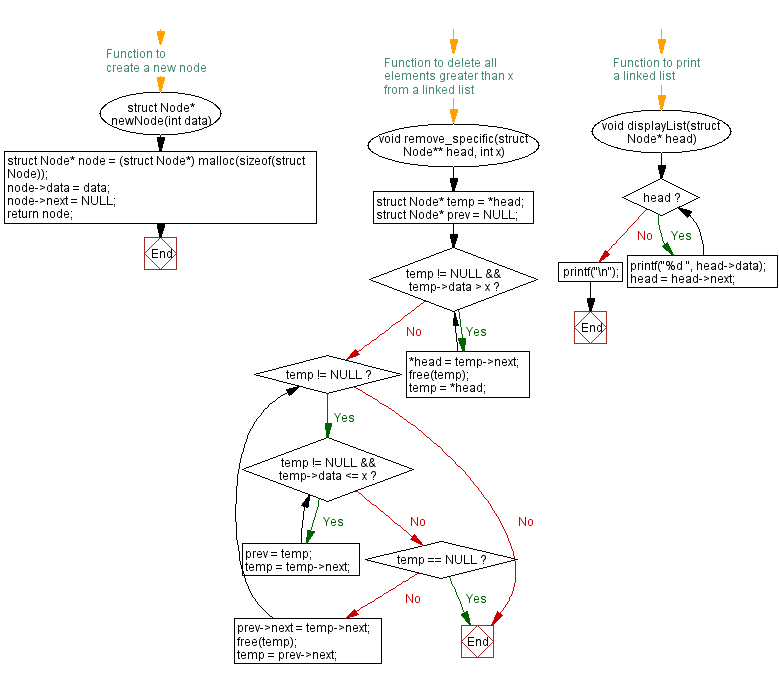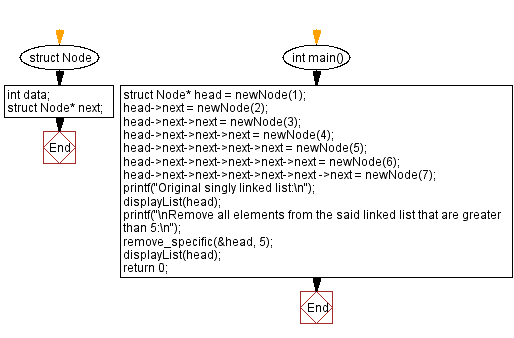C Exercises: Delete all elements greater than x from a linked list
37. Conditional Removal Challenges
Write a C program to remove all elements from a singly linked list that are greater than a given value x.
Sample Solution:
C Code:
#include<stdio.h>
#include<stdlib.h>
// Structure defining a node in a singly linked list
struct Node {
int data; // Data stored in the node
struct Node* next; // Pointer to the next node
};
// Function to create a new node with given data
struct Node* newNode(int data) {
struct Node* node = (struct Node*) malloc(sizeof(struct Node)); // Allocate memory for a new node
node->data = data; // Assign data to the new node
node->next = NULL; // Initialize the next pointer as NULL
return node; // Return the newly created node
}
// Function to delete all elements greater than x from a linked list
void remove_specific(struct Node** head, int x) {
struct Node* temp = *head; // Initialize a temporary pointer to the head of the list
struct Node* prev = NULL; // Pointer to store the previous node
// Removing nodes with data greater than x from the start of the list
while (temp != NULL && temp->data > x) {
*head = temp->next; // Update the head to the next node
free(temp); // Free the memory of the removed node
temp = *head; // Move temp to the new head
}
// Traverse the remaining list to remove nodes with data greater than x
while (temp != NULL) {
// Traverse until finding a node with data less than or equal to x
while (temp != NULL && temp->data <= x) {
prev = temp; // Store the current node as previous
temp = temp->next; // Move to the next node
}
// If all remaining nodes are less than or equal to x, exit
if (temp == NULL) {
return;
}
// Link the previous node to the next node of temp and free temp node
prev->next = temp->next;
free(temp);
temp = prev->next;
}
}
// Function to print elements of a linked list
void displayList(struct Node* head) {
while (head) {
printf("%d ", head->data); // Print the data of the current node
head = head->next; // Move to the next node
}
printf("\n");
}
// Main function to demonstrate removing elements greater than x from a linked list
int main() {
struct Node* head = newNode(1); // Create the linked list with some initial nodes
head->next = newNode(2);
head->next->next = newNode(3);
head->next->next->next = newNode(4);
head->next->next->next->next = newNode(5);
head->next->next->next->next->next = newNode(6);
head->next->next->next->next->next ->next = newNode(7);
printf("Original singly linked list:\n");
displayList(head); // Display the original list
printf("\nRemove all elements from the said linked list that are greater than 5:\n");
remove_specific(&head, 5); // Remove elements greater than 5 from the list
displayList(head); // Display the modified list after removal
return 0;
}
Sample Output:
Original singly linked list: 1 2 3 4 5 6 7 Remove all elements from the said linked list that are greater than 5: 1 2 3 4 5
Flowchart :


For more Practice: Solve these Related Problems:
- Write a C program to recursively remove nodes from a linked list that are greater than a given value x.
- Write a C program to remove nodes with values greater than x and then sort the remaining nodes in ascending order.
- Write a C program to remove nodes greater than x only if their values are prime numbers.
- Write a C program to remove nodes greater than x and count how many nodes were removed in the process.
Go to:
PREV : Block Reversal Variants.
NEXT : Pair Sum Search Challenges.
C Programming Code Editor:
Have another way to solve this solution? Contribute your code (and comments) through Disqus.
What is the difficulty level of this exercise?
